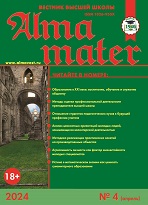UDC 37.09:336
https://doi.org/10.20339/AM.01-21.043
E.S. Vylkova is Dr.Sci. (Economy), Prof., Prof. at sub-faculty of Economics at Russian Academy of National Economy and Public administration under the President of the Russian Federation, North-West Institute of management — branch е-mail: vylkova-es@ranepa.ru; N.G. Viktorova is Dr.Sci. (Economy), Ass. Prof., Prof. at Graduate School of Engineering and Economics, St. Petersburg Polytechnic Peter the Great University е-mail: viktorova_ng@spbstu.ru; and E.N. Evstigneev is Cand.Sci. (Economy), Prof., Prof. at Graduate School of Engineering and Economics, St. Petersburg Polytechnic Peter the Great University е-mail: eennn@mail.ru
Presented is research in development of Higher education, and in particular the fiscal and financial, that should be considered on the basis of a systemic integrated approach, that allows for the comprehensive construction of conceptual models of economic education. Smart education must be developed through the use of progressive elements of all pedagogical approaches, connectivism ideas related to the specifics of the learning process in the age of digital transformation, as well as system engineering. The concept of higher vocational and economic education in the tax sphere includes the presentation of systemic paradigms, scientific approaches and technologies that reveal the role and place of education in the country’s economic system and in the education system as a whole. It consists in a transition from a knowledgeable approach to a competent, student-teacher-turned-sovereign active subjects of cognitive activity who are able to build their personalized knowledge. This is to be facilitated by the creation of personal learning environments. The article defines the contours of the meaningful part of the personal learning environment, presents its scheme for the teacher of tax disciplines and for students in these disciplines. In today's conditions, it is advisable to widely play the educational process in universities to form super-professional skills, improve creativity, creativity and the ability to work in a team in all participants of the educational system, including using the method of VIRTUOSO. The competent use of an integral approach to the transformation of the domestic higher financial education is designed to improve the professional and super-professional competences of graduates, to increase their competitiveness in the global market of educational services, and labort.
Key words: Higher education, educational process, integral approach, competence, personal learning environment, gamification.
References
1. Belchikov, Ya.M., Birsteyn, M.M. Business games. Riga: ABOTS, 1989.
2. Bessmertny, A.M., Gaenkova, I.V. Gamification as educational paradigm of education. Izvestia of Volgograd state pedagogical university. 2016. No. 6 (110). P. 15–22.
3. Vylkova, E.S. Role plays as innovative approach to improvement of quality of educational process in university. Alma mater (Vestnik vysshei shkoly). 2014. No. 2. P. 87–90.
4. Vylkova, E.S. Improvement of gamefication of educational process with the aim of development competences of graduates of universities. Alma mater (Vestnik vysshei shkoly). 2020. No. 6. P. 45–51. DOI: 10.20339/AM.06-20.045
5. Vylkova, E.S. Sociological questionnaire in frames of new method of training “Variant game solution of difficult educational tasks” (VIRTUOZ). Alma mater (Vestnik vysshei shkoly). 2016. No. 4. P. 21–30. DOI: 10.20339/AM.04-16.021
6. Gates, B. Business with speed of thinking. Moscow: EKSMO-Press, 2001.
7. Evstigneev, E.N., Viktorova, N.G. Informational, technological and cadres aspects of tax management. Economy. Taxes. Law. 2014. No. 6. P. 95–100.
8. Egorova, Yu.A. Educational cognitive activity of university student as object of system analysis. Young scientist. 2014. No. 19. P. 533–538.
9. Verbah, K., Hanter, D. To draw in and to rule. Game thinking in service of business. Moscow: Mann, Ivanov and Ferber, 2014.
10. Nefediev, I., Bronnikova, M. Gamification in business and in life: change routine into game. Moscow: AST, 2019.
11. Nikitin, S.I. Gamification, igrofication, igraization in educational process. Young scientist. 2016. No. 9 (113). P. 1159–1162.
12. Raitskaya, L.K. Didactic concept of independent educational cognitive activity of students in Internet environment: аbstr. diss. … Dr.Sci. (Pedagogy). URL: http://ecoanthropology.com/data/documents/9.-Raickaya-2013.pdf
13. Slepukhin, A.V. Use of personal educational environment in the process of individualization of combined training of students. Pedagigical education in Russia. 2014. No. 11. P. 195–205.
14. Starodubtsev, V.A. Creation of personal educational environment of university lecturer. Tomsk: Tomsk polytechnic university publ., 2012.
15. Toporov, V.N. On some theoretical bases of ethimologic analysis. In: Toropov, V.N. Researches in ethimology and semantic. Vol. 1 Theory and some special supplements of it. Moscow, 2004.
16. Fedotova, V.S. Discursive analyses of paradigms of education on modern stage: formation of new paradigm of education. URL: htts://www.elibrary.ru/item.asp?id=30020702
17. Marczevsky, A. Eve Ninja Monkeys Like to Play: Gamification. Game Thinking & Motivational Design. Gamified UK. 2015.
18. Bredl, K. Serious games and virtual worlds in education, professional development, and healthcare. IGI Global. 2013.
19. Pappas, Ch. How Gamification Reshapes Learning. URL: https://elearningindustry.com/free-ebook/gamification-reshapes-learning/...
20. Yu-kai Chou. Actionable Gamification. Beyond Poits, Badges, and Leaderboards. Create Space Independent Publishing Platform. 2015.











.png)






